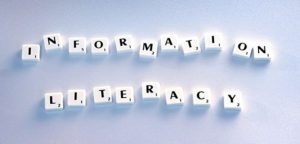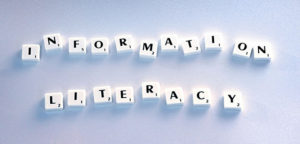Tuesday 7th February will see #uklibchat‘s enthusiastic community of library and information professionals discuss all things ‘information literacy’. #uklibchat is a monthly discussion group that takes place on Twitter from 6.30 to 8.30pm (UK time), using the Twitter account @uklibchat and the hashtag. For the interested but apprehensive first-timer, lurkers are also welcome to #uklibchat!
To promote the upcoming chat, Laura Woods (Secretary of the IL Group Committee and Subject Librarian for Computing and Engineering at the University of Huddersfield) contributed this great feature article on behalf of the CILIP Information Literacy Group (cross-posted here with permission from #uklibchat).
Find more general information on #uklibchat on their FAQs page.
For details of next Tuesday’s chat topics, see the chat agenda.
Feature post #41: Information Literacy – Why should you care?
– by the CILIP Information Literacy Group (Twitter: @infolitgroup)
Since 2004, information literacy (IL) has been defined by CILIP as “Knowing when and why you need information, where to find it, and how to evaluate, use and communicate it in an ethical manner.” While this definition is admirably succinct, it is of limited use in advocating for the role of information professionals in supporting an informed, engaged and information literate citizenry.
The Information Literacy Group (ILG), a special interest group of CILIP, is currently redrafting CILIP’s definition of information literacy. IL is a key strand of CILIP’s 2020 strategy and as such it is imperative that the definition is fit for purpose and enables advocacy, especially with those outside the Library and Information Services (LIS) sector.
Our aim is to agree a definition that is flexible enough to advocate for IL in various sectors: one that can not only underpin IL work across the diverse LIS field but also be recognised and understood outside the LIS echo chamber.
As well as CILIP’s formulation, other definitions and models abound, including SCONUL’s 7 Pillars model, and ACRL’s recently developed Framework for Information Literacy for Higher Education. This proliferation of models and definitions suggests that there is a real need among information professionals for a practical grounding in this fundamental principle of our profession.
Why is information literacy important?
IL is vital to navigating the complex, crowded information landscape of the 21st century. In our daily lives we are now confronted with more information than ever before, much of it confusing, conflicting, misleading, or simply inaccurate. Critical appraisal of information is a vital skill, but one that is often seen to be lacking.
This issue resonates across all fields of information work. In practice, IL as a concept tends to be most recognised within the education sectors of LIS: schools, further and higher education. This is to be expected, as there is an obvious opportunity to embed information literacy within the learning process. In these sectors, librarians aim to foster a culture where information literacy is seen as an integral part of learning, rather than a separate process belonging to the library: however, different librarians and institutions have varying success with this!
Although other LIS sectors may not make such explicit reference to IL, it is a mistake to dismiss it as “something academic libraries do” (as once overheard from a colleague in the corporate sector!). The critical appraisal of information is, and should be seen as, the underpinning of information work in all sectors. Some examples of the importance of IL in various sectors are outlined below.
Information literacy in the health sector

Accurate information is critical to health professionals. Inaccurate or misleading information in the context of people’s health can lead to serious harm, and can even be life threatening. It is therefore crucial that those working in the health sector are able to accurately assess information needs, seek and locate, and interpret and act upon information in the course of their work.
IL is particularly important in the context of evidence-based practice, which requires healthcare professionals to integrate “research evidence, clinical expertise and the interpretation of patients’ needs and perspectives in making decisions.” (Craig and Stevens 2012, p.3).
Information literacy in special libraries
Librarians and information professionals are employed in a wide variety of organisations, including commercial firms, government and charities, in what are usually known as ‘special’ or workplace libraries. Although many have no physical library, these information professionals are nevertheless engaged in helping their colleagues and clients find and use accurate information to support policies, campaigns, and business decisions.
The term “information literacy” may not be often used within this sector, but it is still key to the work special librarians do. For example, a librarian in a law firm may need to ensure the lawyers they work with understand the hierarchy of the courts when determining the relevance of case law. A librarian in a charity or government library may need to source and interpret the latest evidence to support a campaign or policy position. Again, a librarian in a business may need to sift fact from rumour when analysing competitive intelligence.
Information literacy in public libraries
Public libraries and librarians have a vital role to play in supporting an information literate population. Activities such as lifelong learning, internet safety and privacy awareness, reader support, and civic engagement – such as hosting MP surgeries or acting as a focal point for local campaign groups – are all avenues that could be used to develop IL in the general public.
Of course, the ability of public libraries to fulfil this role relies on having a well-funded, professionally staffed public library service, which unfortunately is no longer the case in the UK. Campaigns such as CILIP’s My Library By Right aim to hold the government and local authorities to their legal duty to provide a quality library service. In the campaign materials, information literacy is highlighted as an activity provided by, and a benefit of, a professional, well-funded public library.
What can we do?
As librarians and information professionals, we have an understanding of the complexities of information and the importance of an information literate population. We all have a role to play, whether in our professional or our personal lives.
Information Literacy is particularly newsworthy at the moment, with the focus on so-called “post-truth”, filter bubbles, and fake news, following the results of the Brexit vote and US presidential election. Several information professionals have already written on how information literacy can tackle this problem, including Claire McGuinness on LibFocus, and several members of the Information Literacy Group committee.
As frightening and upsetting as the “post-truth” world can be, the attention on this issue presents an opportunity for librarians and information professionals. We have always had the expertise to tackle this problem, but can sometimes struggle to convince others of its relevance. Now more than ever, we need to ensure information literacy is embedded across all professional sectors and in all spheres of life.
References
Craig, J.V. and Stevens, K.R. (2012) EBP in nursing. In: Smyth, R.L. and Craig, J.V. The EBP manual for nurses. 3rd ed. Edinburgh : Churchill Livingstone Elsevier, p.3-26.
Join the Information Literacy #uklibchat on Tuesday 7th February, 6.30-8.30pm (UK time).

